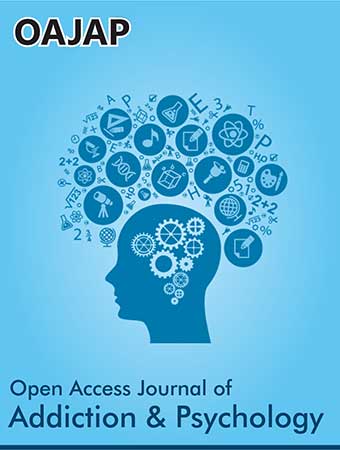 Opinion Article
Opinion Article
Habituated Devotion Cooked in An Existential Hermeneutical Phenomenological Way
Todd DuBose*
Department of Psychology, The Chicago School of Professional Psychology, USA.
Todd DuBose, Department of Psychology, The Chicago School of Professional Psychology, USA.
Received Date: May 26, 2022; Published Date: June 10, 2022
Opinion
There are alternative options for understanding caring for the experience of addiction other than a medical-disease model. Below is bullet pointed aphorisms from an Existential Hermeneutical Phenomenological (EHP) approach for consideration.
We are all addicted, only in different ways: some to chemicals, some to cell phones, and some to being woke.
There is neither pure sobriety nor pure relapse: Recovery ushers us into our next devotion. Addiction, (ethismos), means habituation or devotion, which applies to us all, no more of them vs us. Who we are, is how we are in situations, and how we are in situations is how we live out our particular comportments of mattering.
As a human phenomenon of existence, of course, the event of addiction has also fallen as a casualty of medicalization. It is existentially unavoidable that any kind of addiction or any kind of sobriety necessitate some kind of engagement with loss and deprivation. Change is a death of an at-home-ness; we are able to shift devoted habituations when we are ready to not-be-at-home.
Addiction is a pathology only in that it is pathos: both suffering and joy of the soul. Soul as enactments of significance are not physical, medical diseases; they are lived meanings that are invisible, immeasurable albeit ubiquitous in each and every moment—a very different kind of empiricism.
Treating speech of the suffering or joyful soul (psychopathology) with natural science, deficit-corrective, algorithmic, programmable, clinical procedures is like using a vacuum cleaner to cook spaghetti, the wrong tool for the wrong task. Devoted to plasticity: Although each and every moment is “chemical”, there is no chemical without meaning, no neuron de-contextualized from significance: bios and logos are inseparable.
Symptoms are not pathogens to be eliminated like a malignant tumor; they are our unexpected teachers: what can we learn from the wisdom of addiction?
Being intoxicated-in-the-world is not a privation or failure of being sober-in-the-world; it is a different, not deficient, way of being-in-the-world. What shall be, what was, and what is, all give and take, just do so differently. The fatal mistake in caring for addicted ways of being in the world: privileging recovery over discovery.
Abstinence: Liberation from, or perpetuation of, unsustainable, Gnostic purification?
The choice to use again is a protest of sobriety’s oppressive regimentation.
An EHP approach neither requires nor praises sobriety, and neither punishes nor prohibits use; Each are hosts welcome to the communal meal. Accountability, responsibility and choice are neither qualities we find, create nor lose, but that which we are to notice, here, now, already and always. Choice doesn’t get a pass when chemical altered; If therapists weren’t so unwittingly shaming in the name of care, maybe we can own what we experience or how human, all too human, we are.
Want to decrease stigma? Stop correcting deficits!
Understand that we cannot fully understand without colonizing and incorporating the other’s Otherness. There is always and already sugar in the sand dune and vice versa: Such is the unknotting of soul offered by hermeneutical vertigo and its incessant reinterpretability. There is no Truth, only truths, no Reality, only realities, no Singular Capitalization, only small case pluralization’s.
To choose or not to choose: That is not the question. Which choice and for what purpose is our task. EHP neither explains nor prescribes; rather, it hosts and describes. EHP care: being-with rather than doing-to, companioning rather than dictating, inviting what might be, rather than engineering what should be.
Relapse and use: archangels delivering us from perfection.
Rationality over irrationality; independency over dependency; autonomy over reliance: Patriarchal supremacy’s last ride. We are not addicted to a chemical or thing or action, but devoted to where they take us, such vehicles of transcendence, whether to security, relief, enhancement, distraction, numbness, calm, intensity or otherwise. EHP care is undecidably trans-immanent: all pathways both fit and don’t fit, are helpful and harmful, say yes and no, deliver us and confine us, where backwards is forward, and side-tracking is the next frontier.
As undecidably trans-immanent, relapse is not a failure, nor sobriety an accomplishment. What is behind me and in front of me are in the ungraspable now. There is no “re” anything: re-lapse, recovery… as no moment is repeatable.
Acknowledgement
None.
Conflict of Interest
Author declare no conflict of interest.
-
Todd DuBose. Habituated Devotion Cooked in An Existential Hermeneutical Phenomenological Way. Open Access J Addict & Psychol 5(4): 2022. OAJAP.MS.ID.000617. DOI: 10.33552/OAJAP.2022.05.000617.
Phenomenological Way, Devotion Cooked, Existential, Hermeneutical, Deprivation, Devoted habituations, Immeasurable albeit ubiquitous, Empiricism, Counseling, Natural science
-

This work is licensed under a Creative Commons Attribution-NonCommercial 4.0 International License.






